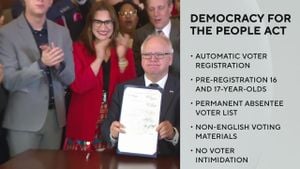Elon Musk has reignited tensions with former ally Sam Altman by leading a multi-billion dollar investment group to propose acquiring OpenAI, the non-profit organization behind ChatGPT, for $97.4 billion. The audacious attempt to reclaim control over OpenAI marks a significant shift after Musk's contentious departure from the organization.
According to reports, Musk’s proposal, submitted to OpenAI’s board on February 10, 2025, has stirred the pot within the tech community, causing Altman to respond with swift rejection via social media. "No, thank you," Altman declared, adding with a sharp wit, "but if you’re willing, we’ll make you an offer of $9.74 billion for Twitter (now X)." Musk quickly labeled Altman as a "liar" on the platform, underscoring the deep divide between the two.
The motivations behind Musk's offer, as articulated by his lawyer Marc Toberoff, suggest aims beyond mere acquisition. Toberoff stressed the desire to restore OpenAI to its founding purpose—a non-profit dedicated to ensuring safe and beneficial AI development. Musk himself echoed this sentiment, stating, "Now is the time to let OpenAI return to being the open-source, safety-focused non-profit it once was; we will make sure this happens." This perspective aligns with Musk's long-standing criticism of OpenAI’s evolution toward profitability and corporate partnership, particularly with tech giant Microsoft.
Altman’s rejection of Musk's bid did not come without pointed remarks. He suggested Musk's offer was not taken seriously and insinuated the proposal was primarily aimed at stalling competition. "I think this is to slow down our competition, to catch up with him (Musk)," Altman remarked, reflecting the undercurrent of rivalry between the two tech titans.
OpenAI’s transition over the years, especially since Altman took over as CEO following Musk's exit from the company’s board, has marked its pivot from non-profit research entity to commercial powerhouse, launching tools like ChatGPT which have transformed the AI industry. Following the founding of OpenAI back in 2015, Altman and Musk were united by visions of safe AI development; yet, stark differences have grown, particularly as OpenAI shifted focus to monetize its groundbreaking technologies.
Since leaving OpenAI's board in 2018, Musk has become increasingly vocal about his opposition to the organization’s decisions. He has recently filed legal petitions questioning OpenAI's transition to profit-making and expressing concerns over its market partnerships which he believes may stifle competition. These legal maneuvers suggest Musk’s efforts to challenge the corporate structure and strategic choices implemented under Altman’s leadership, which have drawn criticism for prioritizing profit over benevolence.
Now, with the newly proposed acquisition, Musk aims to regain influence over OpenAI's direction. The proposed deal, if it progresses, could dramatically reshape the ownership and operations of the AI giant. Musk, along with his backing investors, including noted venture funds and his own AI startup, xAI, aspires to reclaim OpenAI’s commitment to altruism.
Despite the fervor Musk brings, the mechanics of such a transition involve significant legal and structural challenges. OpenAI’s non-profit structure entails strict regulations, and determining asset valuations amid such transitions poses issues ripe with complications. Musk's unsolicited bid has set high stakes, potentially yielding significant control for whoever manages to navigate the necessary channels for acquisition.
Industry analysts are closely observing the developments, questioning the viability of Musk’s overture amid Altman’s committed restructuring plans for OpenAI. While Musk calls for transparency and adherence to initial non-profit goals, Altman appears poised to continue down the path of commercialization, potentially jeopardizing the cooperative spirit which originally spurred the organization’s founding.
Reflecting on the competitive atmosphere, experts theorize how the outcome of this acquisition attempt will signpost the future of AI development frameworks and corporate governance surrounding AI technologies. The rivalry encapsulated within this dispute may well set precedents for how similar tech organizations navigate ethical vs. lucrative objectives.
For now, the narrative between Elon Musk and Sam Altman continues to evolve, pitting the founding visionary against the current steward of OpenAI as they both seek to shape the future of artificial intelligence, welfare technology, and corporate responsibility.
This dramatic back-and-forth promises to not only influence the operations within OpenAI but also could ripple across the broader tech industry, as discussions around the ethical responsibilities of AI creators press on.



